The AMD Ryzen 9 7950X3D Review: AMD's Fastest Gaming Processor
by Gavin Bonshor on February 27, 2023 9:00 AM ESTCPU Benchmark Performance: Rendering And Encoding
Rendering tests, compared to others, are often a little more simple to digest and automate. All the tests put out some sort of score or time, usually in an obtainable way that makes it fairly easy to extract. These tests are some of the most strenuous in our list, due to the highly threaded nature of rendering and ray-tracing, and can draw a lot of power.
If a system is not properly configured to deal with the thermal requirements of the processor, the rendering benchmarks are where it would show most easily as the frequency drops over a sustained period of time. Most benchmarks in this case are re-run several times, and the key to this is having an appropriate idle/wait time between benchmarks to allow for temperatures to normalize from the last test.
One of the interesting elements of modern processors is encoding performance. This covers two main areas: encryption/decryption for secure data transfer, and video transcoding from one video format to another.
In the encrypt/decrypt scenario, how data is transferred and by what mechanism is pertinent to on-the-fly encryption of sensitive data - a process by which more modern devices are leaning to for software security.
We are using DDR5 memory on the Ryzen 9 7950X3D and the other Ryzen 7000 series we've tested. This also includes Intel's 13th and 12th Gen processors. We tested the aforementioned platforms with the following settings:
- DDR5-5600B CL46 - Intel 13th Gen
- DDR5-5200 CL44 - Ryzen 7000
- DDR5-4800 (B) CL40 - Intel 12th Gen
All other CPUs such as Ryzen 5000 and 3000 were tested at the relevant JEDEC settings as per the processor's individual memory support with DDR4.
Rendering
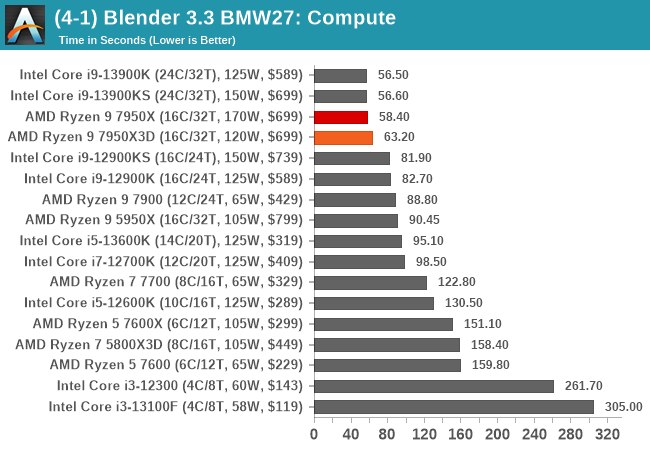
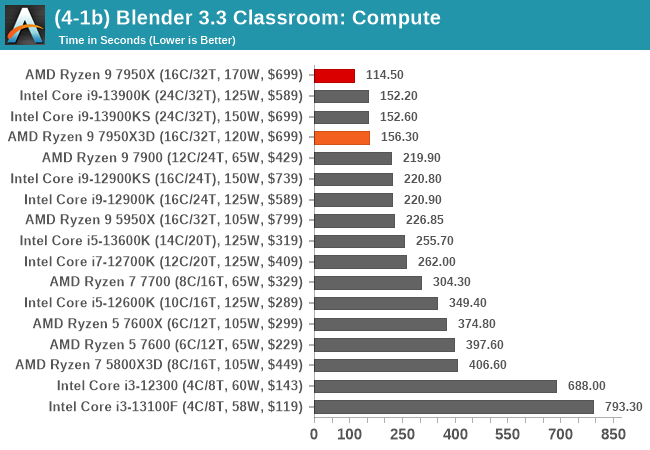
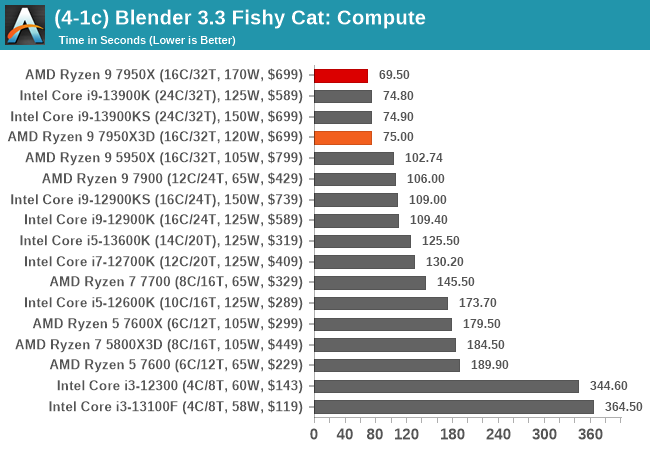
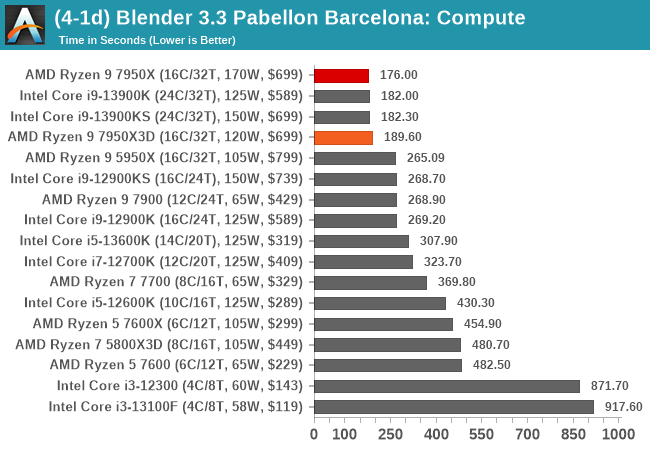
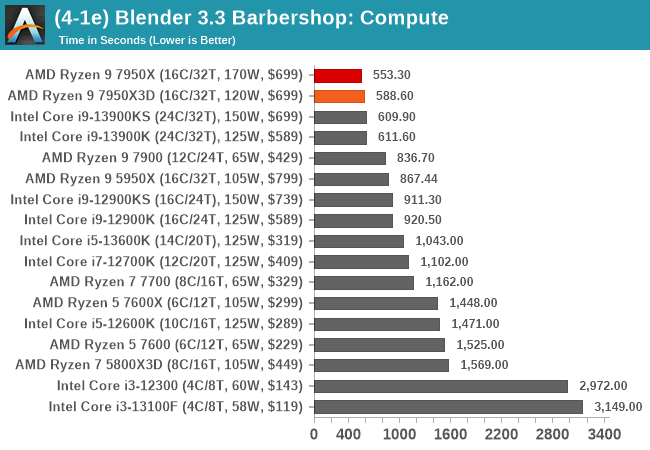
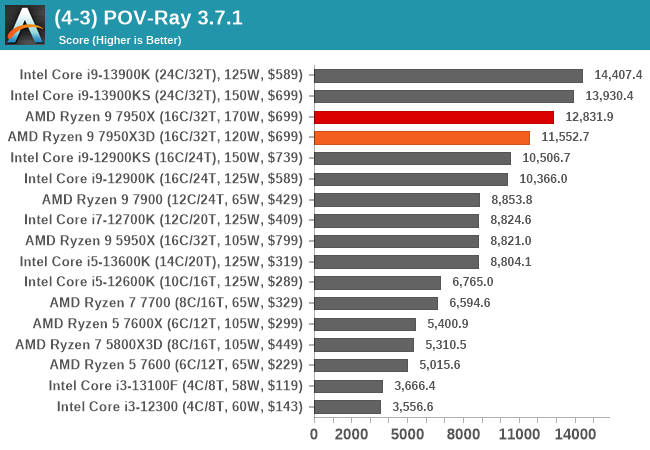
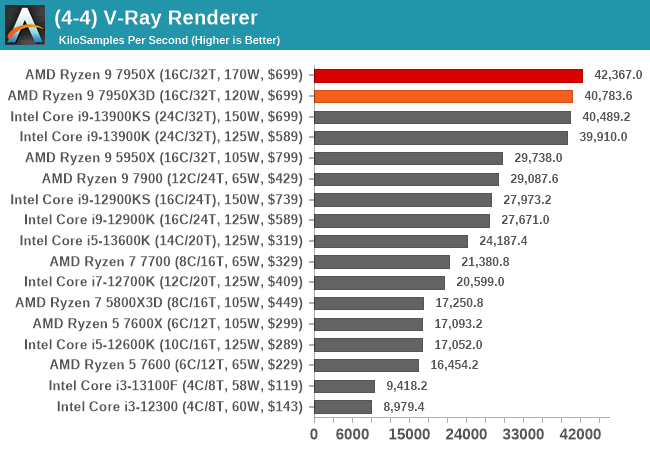
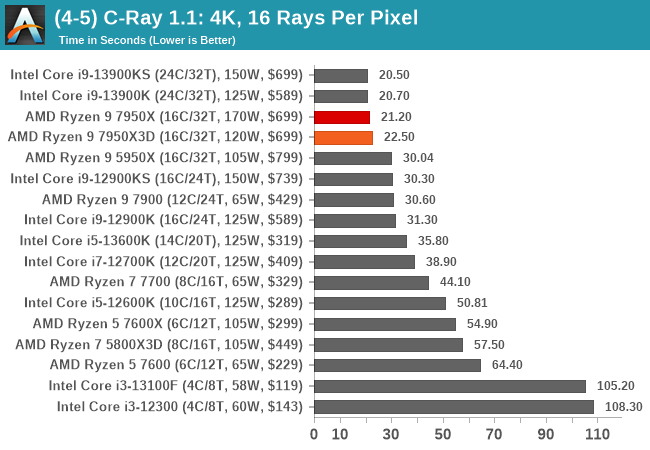
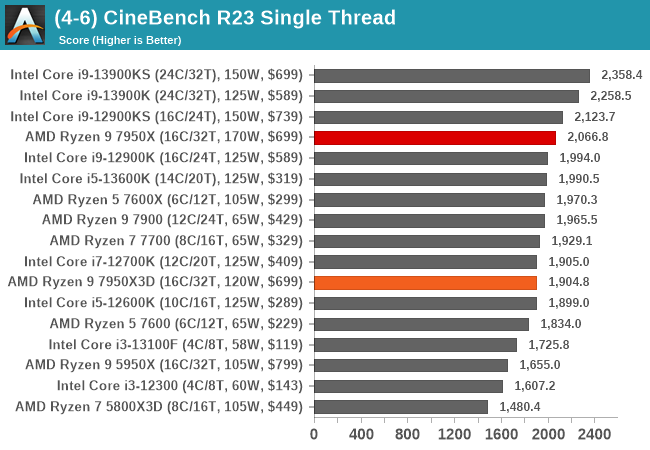
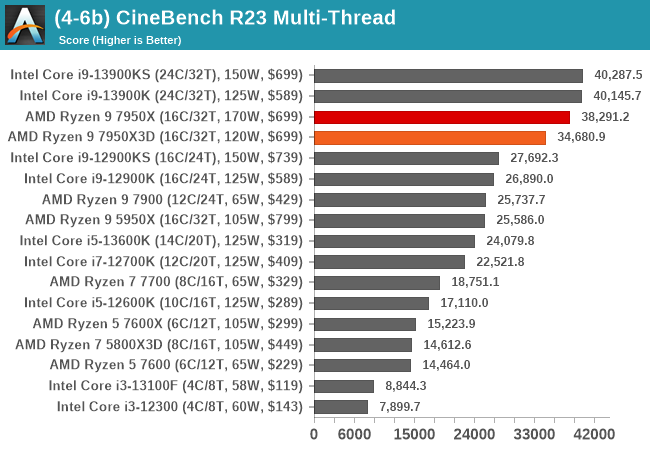
When it comes to rendering, the Ryzen 9 7950X3D doesn't quite hit the compute performance of the Ryzen 9 7950X, but it isn't too far off, given the discrepancies in power usage. It shows that the 7950X3D is more than capable of rendering workloads in an effective manner.
Encoding
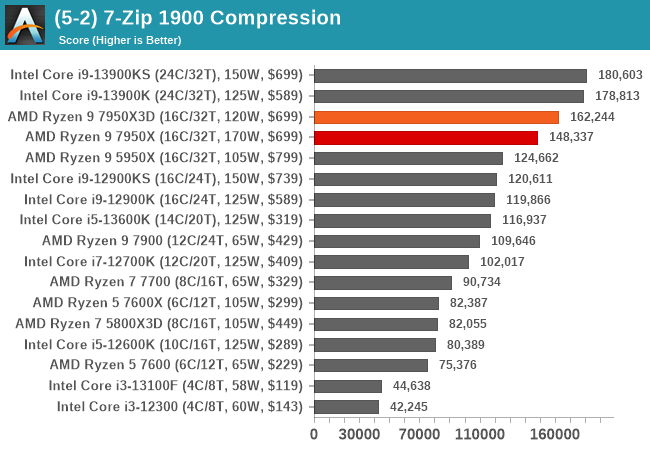
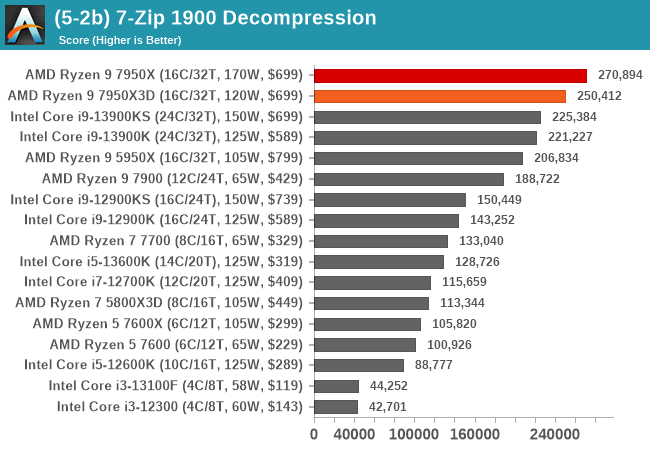
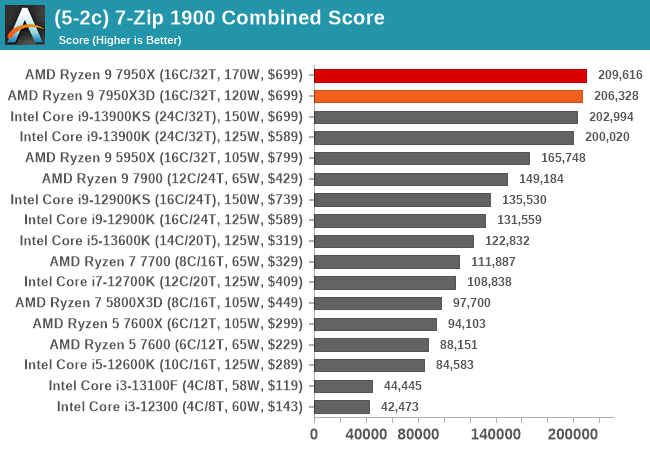
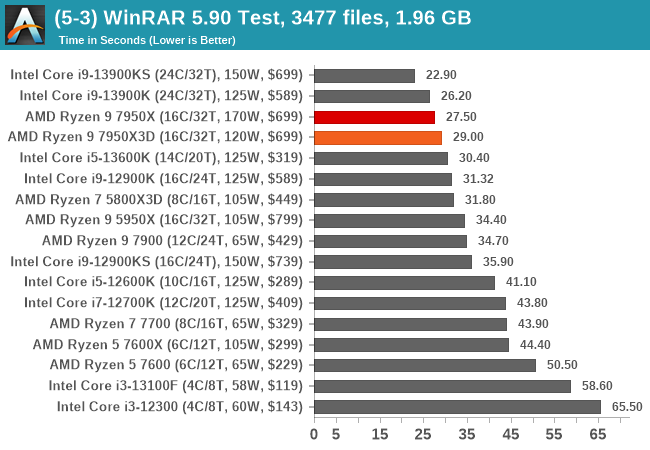
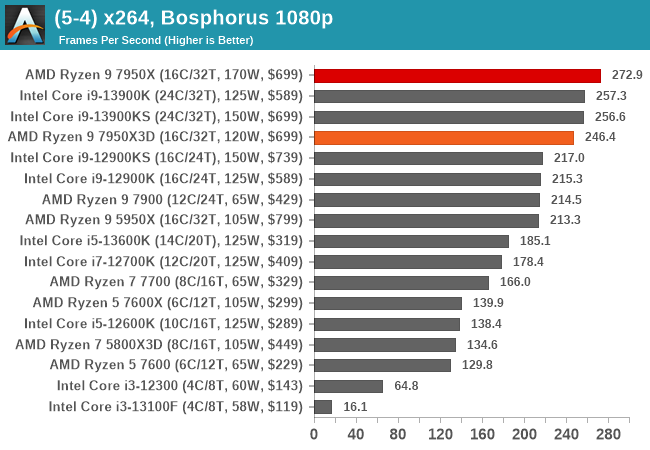
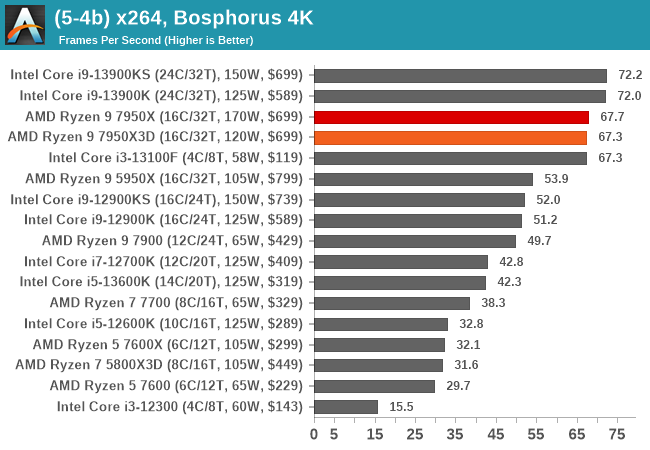
Our encoding section of the test suite is similar to other sections, where the 7950X is the faster and more power-hungry chip, which does output more performance. The Ryzen 9 7950X3D does however put in a respectable performance.










122 Comments
View All Comments
demian_thorne - Wednesday, March 1, 2023 - link
It is typical under articles and threads like this to hear and see all kinds of extreme opinions based on everyones personal pet peeves...I think your comment was the most sensible of them all ! Very well done !
milleron - Monday, February 27, 2023 - link
Thanks. For me, your testing suggests pretty strongly that I am best served by simply keeping my current 7800X3D rig — i.e., keep the current motherboard, 7800X3D, RAM, and SSDs but spend the money upgrading from an RTX 3080 to a 4080 or 4090. I WOULD like to see a test of MS Flight Simulator at 1440 and 4K before a final decision, but those should be forthcoming from the MFS forums soon enough.AvidGamer - Monday, February 27, 2023 - link
Do you happen to work for AMD or one of its system partners? If not you most likely intended to write 5800X3D right? After all the 7800X3D hasn't been released yet, at least not to my knowledge at the time of writing.milleron - Monday, February 27, 2023 - link
Sorry, regarding the above post, I currently have a 5800X3D rig, NOT a 7800X3D, which, obviously, does not currently exist. Too bad this website doesn't allow editing of comments.Gavin Bonshor - Monday, February 27, 2023 - link
The 5800X3D is still a VERY GOOD processor for gaming. And given it's around $330 right now and can be paired with DDR4 memory/AM4 motherboards, for the price, it'll be hard to beat for gamers on a budget.Of course, a discrete graphics card is required, but the more spent on a GPU, the better the gaming performance will be.
rb86 - Monday, February 27, 2023 - link
You said in the comments you're still doing testing. Will a new article be posted with your updated results or will this article be modified? These Factorio results are shockingly disappointing. Is there no way to force an application to start on the core with the 3D cache on it?Gavin Bonshor - Monday, February 27, 2023 - link
I certainly am, and they are running while I do my evening things. As the tidbit on the last page highlighted, Factorio performance SHOULD be higher, but AMD's PPM/3D V-Cache Performance Optimizer drivers didn't pick up the fact Factorio was running. This is primarily due to our benchmark that is running without a UI, and it's possibly why XBOX Game Bar didn't pick it up.On that note, I'll be doing more testing with the 7950X3D set to Cache and Frequency to see if AMD's drivers got it wrong on more in our test suite than just Factorio and possibly Dwarf Fortress.
As for if it will be an article update or a fresh page, I would say the update is more likely, but this will be explored when I have the data and if it makes THAT much of an impact on performance.
We shall see, but first, I need to collect more data.
flydian - Monday, February 27, 2023 - link
So far, all this has done is to sell me on the Ryzen 5 7600X. Maybe I'll wait for that 7800X3D before buying parts to upgrade from my 10th gen Intel CPU.meacupla - Monday, February 27, 2023 - link
the driver to park CPU cores to get windows to use the correct cores when gaming seems like such a hack workaround. I think AMD should have stuck to homogeneous cores, or gone the intel route and have a big-small configuration that the OS has an easier time of handling.Otritus - Monday, February 27, 2023 - link
The problem with big small is what is a big-core? Some workloads need higher frequency, others higher cache, and some a bit of both. I don’t understand why DirectX and Vulcan API calls couldn’t have been automatically routed to the V-cache CCD, and everything else to the frequency CCD. AMD clearly needed to spend more time optimizing the scheduler for their processors. Intel spent years building a new hardware scheduler and directly working with Microsoft to maximize performance.